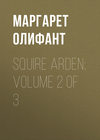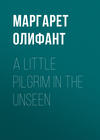Buch lesen: «Phoebe, Junior», Seite 8
CHAPTER XI
PHŒBE'S PREPARATIONS
A few days after Ursula's return home, another arrival took place in Carlingford. Phœbe Beecham, after considering the case fully, and listening with keen interest to all the indications she could pick up as to the peculiarities of her grandfather's house, and the many things in life at Carlingford which were “unlike what she had been used to,” had fully made up her mind to dare the difficulties of that unknown existence, and to devote herself in her mother's place to the care of her grandmother and the confusion of Mrs. Tom. This was partly undertaken out of a sense of duty, partly out of that desire for change and the unknown, which has to content itself in many cases with the very mildest provision, and partly because Phœbe's good sense perceived the necessity of the matter. She was by no means sure what were the special circumstances that made “Mrs. Tom” disagreeable to her mother, but she was deeply sensible of the importance of preventing Mrs. Tom from securing to herself and her family all that Mr. and Mrs. Tozer had to leave. Phœbe was not mercenary in her own person, but she had no idea of giving up any “rights,” and she felt it of the utmost importance that her brother, who was unfortunately by no means so clever as herself, should be fully provided against all the contingencies of life. She was not concerned about herself in that particular. Phœbe felt it a matter of course that she should marry, and marry well. Self-confidence of this assured and tranquil sort serves a great many excellent purposes – it made her even generous in her way. She believed in her star, in her own certain good-fortune, in herself; and therefore her mind was free to think and to work for other people. She knew very well by all her mother said, and by all the hesitations of both her parents, that she would have many disagreeable things to encounter in Carlingford, but she felt so sure that nothing could really humiliate her, or pull her down from her real eminence, that the knowledge conveyed no fears to her mind. When this confidence in her own superiority to all debasing influences is held by the spotless princess in the poem, it is the most beautiful of human sentiments, and why it should not be equally elevated when entertained by a pink and plump modern young woman, well up in all nineteenth century refinements, and the daughter of the minister of the Crescent Chapel, it would be hard to say. Phœbe held it with the strongest faith.
“Their ways of thinking, perhaps, and their ways of living, are not those which I have been used to,” she said; “but how does that affect me? I am myself whatever happens; even if poor dear grandmamma's habits are not refined, which I suppose is what you mean, mamma, that does not make me unrefined. A lady must always be a lady wherever she is – Una,” she continued, using strangely enough the same argument which has occurred to her historian, “is not less a princess when she is living among the satyrs. Of course, I am not like Una – and neither are they like the wild people in the wood.”
Mrs. Beecham did not know much about Una, except that she was somebody in a book; but she kissed her daughter, and assured her that she was “a real comfort,” and devoted herself to her comfort for the few days that remained, doing everything that it was possible to do to show her love, and, so to speak, gratitude to the good child who was thus throwing herself into the breach. The Beechams were in no want of money to buy what pleased them, and the mother made many additions to Phœbe's wardrobe which that young lady herself thought quite unnecessary, not reflecting that other sentiments besides that of simple love for herself were involved.
“They shall see that my daughter is not just like one of their common-looking girls,” Mrs. Beecham said to her husband; and he shared the feeling, though he could not but think within himself that her aspect was of very much more importance than the appearance of Phœbe Tozer's child could possibly be as his daughter.
“You are quite right, my dear,” he replied, “vulgar people of that sort are but too ready to look down upon a pastor's family. They ought to be made to see the difference.”
The consequence of this was that Phœbe was fitted out like a young princess going on her travels. Ursula May would have been out of her wits with delight, had half these fine things come her way; but Phœbe took them very calmly.
“I have never undervalued dress,” she said, “as some girls do; I think it is a very important social influence. And even without that, mamma, so long as it pleases you – ” So with this mixture of philosophy and affection all went well.
“We must call on Mrs. Copperhead before you go; they would think it strange, after all the interest they have shown in us.”
“Have they shown an interest in us?” said Phœbe. “Of course we must call – and Mrs. Copperhead is a lady, but as for Mr. Copperhead, mamma – ”
“Hush! he is the leading member, and very influential in the connection. A pastor's family must not be touchy, Phœbe. We must put up with a great many things. There ought to be peace among brethren, you know, and harmony is the first thing that is essential in a church – ”
“I wonder if harmony would be as essential, supposing Mr. Copperhead to come to grief, mamma.”
“Phœbe! slang from you – who have always set your face against it.”
“What can one talk but slang when one thinks of such a person?” said Phœbe gravely; and thus saying she opened the door for her mother, and they went out in their best gowns to pay their visit. Mrs. Copperhead was very civil to the pastor's family. It was not in her to be uncivil to any one; but in her soft heart she despised them a little, and comported herself to them with that special good behaviour and dignified restraint which the best natured people reserve for their inferiors. For though she went to chapel, taken there by Mr. Copperhead, she was “church” at heart. The interest which Mrs. Beecham took in everything, and the praises she bestowed on the ball, did not relax her coldness. They were too well off, too warm and silken to call forth her sympathies, and there was little in common between them to afford any ground for meeting.
Yes, Mr. Copperhead was quite well – she was quite well – her son was quite well. She hoped Mr. Beecham was well. She had heard that most people were pleased with the ball, thank you. Oh, Miss Beecham was going away – indeed! She hoped the weather would be good; and then Mrs. Copperhead sat erect upon her sofa, and did not try to say any more. Though she had not the heart of a mouse, she too could play the great lady when occasion served. Clarence, however, was much more hospitable than his mother. He liked Phœbe, who could talk almost as if she was in society, as girls talk in novels. He knew, of course, that she was not in society, but she was a girl whom a fellow could get on with, who had plenty to say for herself, who was not a lay figure like many young ladies; and then she was pretty, pink, and golden, “a piece of colour” which was attractive to the eye. He soon found out where she was going, and let her know that he himself intended a visit to the neighbourhood.
“The Dorsets live near,” he said. “Relations of my mother. You saw them at the ball. I dare say you will meet them somewhere about.” This, it is to be feared, Clarence said in something of his mother's spirit, with a warm sense of superiority, for he knew that the pastor's daughter was very unlikely to meet the Dorsets. Phœbe, however, was equal to the occasion.
“I am not at all likely to meet them,” she said with a gracious smile. “For one thing, I am not going to enjoy myself, but to nurse a sick person. And sick people don't go to parties. Besides, you know the foolish prejudices of society, properly so called. I think them foolish because they affect me,” said Phœbe, with engaging frankness. “If they did not affect me, probably I should think them all right.”
“What foolish prejudices?” said Clarence, thinking she was about to say something about her inferior position, and already feeling flattered before she spoke.
“About Dissenters, you know,” she said; “of course, you must be aware that we are looked down upon in society. It does not matter, for when people have any sense, as soon as they know us they do us justice; but of course you must be aware that the prejudice exists.”
Clarence did know, and with some bitterness; for Mr. Copperhead, though he did not care much, perhaps, about religion, cared for his chapel, and stood by it with unswerving strictness. His son, who was an Oxford man, and respectful of all the prejudices of society, did not like this. But what could he do against the obstinate dissentership of his father? This, as much as anything else, had acted upon the crowd the night of the ball, and made them all nobodies. He hesitated to make any reply, and his face flushed with shame and displeasure. Phœbe felt that she had avenged upon Clarence his mother's haughty politeness. She had brought home to him a sense of the social inferiority which was common to them both. Having done this, she was satisfied, and proceeded to soften the blow.
“It cannot fall upon you, who are in so much better a position, as it does upon us,” said Phœbe. “We are the very head and front of the offending, a Dissenting minister's family! – Society and its charms are not for us. And I hope we know our place,” she said, with mock humility; “when people have any sense and come to know us it is different; and for the foolish ones I don't care. But you see from that, I am not likely to meet your cousins, am I?” she added with a laugh.
“If you mean that they are among the foolish ones – ”
“Oh, no; I don't. But you can't suppose they will take the trouble to find me out. Why should they? People entirely out of my range, and that have nothing to do with me. So you may be quite sure I am right when I say we sha'n't meet.”
“Well,” said Clarence, piqued, “I am going to Easton, and I shall see you, if Mrs. Beecham will give me permission to call.”
“She will give you the address along with that; but till then, good-bye,” said Phœbe. To tell the truth, she had no desire to see Clarence Copperhead in Carlingford. Perhaps he meant something, perhaps he did not – at this stage of the proceedings it was a matter of indifference to Phœbe, who certainly had not allowed “her affections” to become engaged. If he did mean anything, was it likely that he could support unmoved the grandfather and grandmother who were, or had been, “in trade?” On the other hand, was it not better that he should know the worst? Phœbe was no husband-hunter. She contemplated the issue with calm and composure, however it might turn out.
“He asked me if he might call,” said Mrs. Beecham, in some excitement. “I don't care much to have you seen, my darling, out of your own father's house.”
“Just as you please, mamma – just as it suits best,” said Phœbe, dismissing the subject. She was not anxious. A good deal depended on whether he meant anything or nothing, but even that did not conclude the subject, for she had not made up her own mind.
“Why didn't you tell them about the Mays?” said Clarence, as the two ladies went out. “They live in Carlingford, and I should think it would be pleasant on both sides.”
“My dear boy, you forget the difference of position,” said Mrs. Copperhead. “They are Dissenters.”
“Oh, I like that,” cried Clarence, half angry, as himself sharing the disadvantages of the connection. “A needy beggar like May has a great deal to stand upon. I like that.”
“But it is true all the same,” said Mrs. Copperhead, shaking her head. “And you can see the difference at once. I dare say Miss Beecham is a very clever young woman, but between her and Miss May what a difference there is! Any one can see it – ”
“I am afraid then I am stupid, for I can't see it, mother. They are both pretty girls, but for amusing you and that sort of thing give me Phœbe. She is worth twenty of the other. As sharp as a needle, and plenty to say for herself. This is the kind of girl I like.”
“I am very sorry for it. I hope that is not the kind of wife you will like,” said Mrs. Copperhead, with a sigh.
“Oh, wife! they haven't a penny, either the one or the other,” said Clarence, with delightful openness, “and we may be sure that would not suit the governor even if it suited me.”
In the mean time Mrs. Beecham and Phœbe were walking up the broad pavement of Portland Place towards their home.
“It is pleasant to see the mother and the son together,” said Mrs. Beecham, who was determined to see everything in the best light that concerned the Copperheads. “They are so devoted to each other, and, Phœbe, dear – I don't like to talk in this way to a sensible girl like you, but you must see it with your own eyes. You have certainly made a great impression upon Clarence Copperhead. When he said he hoped to see you in Carlingford, and asked, might he call? it was exactly like asking my permission to pay you his addresses; it is very flattering, but it is embarrassing as well.”
“I do not feel particularly flattered, mamma; and I think if I were you I would not give him the address.”
Mrs. Beecham looked anxiously in her daughter's face.
“Is it from prudence, Phœbe, or is it that you don't like him, that you wouldn't have him if he asked you?”
“We must wait till he does ask me,” said Phœbe, decisively. “Till then I can't possibly tell. But I don't want him at Carlingford. I know that grandpapa and grandmamma are – in trade.”
“Yes, dear,” said Mrs. Beecham, in a subdued voice.
“Dissenters, and in trade; and he is going to stay with the Dorsets, fine county people. Don't give him the address; if we meet by chance, there is no harm done. I am not ashamed of any one belonging to me. But you can say that you don't think his father would like him to be visiting me at Carlingford – which I am sure would be quite true.”
“Indeed he might go much farther without finding any one so well worth visiting,” said the mother, indignant, to which Phœbe nodded her head in tranquil assent.
“That is neither here nor there,” she said; “you can always tell him so, and that will please Mr. Copperhead, if ever he comes to hear of it. He thought at one time that I was too entertaining. One knows what that means. I should like him to see how little I cared.”
“But, my dear, Clarence Copperhead would be worth – a little attention. He could give a girl – a very nice position,” Mrs. Beecham faltered, looking at her daughter between every word.
“I am not saying anything against Clarence Copperhead,” said Phœbe, with composure, “but I should like his dear papa to know how little I care, and that you have refused him my address.”
This was all she said on the subject. Phœbe was quite ready to allow that Clarence was everything that her mother had said, and she had fully worked out her own theory on marriage, which will probably be hereafter expounded in these pages, so that she was not at all shocked by having his advantages thus pointed out to her. But there was no hurry, she said to herself. If it was not Clarence Copperhead, it would be some one else, and why should she, at this early stage of her career, attempt to precipitate the designs of Providence? She had plenty of time before her, and was in no hurry for any change; and a genuine touch of nature in her heart made her anxious for an opportunity of showing her independence to that arrogant and offensive “leading member,” who made the life of the office-bearers in the Crescent a burden to them. If she could only so drive him into a corner, that he should be obliged to come to her in his despair, and beg her to accept his son's hand to save him from going off in a galloping consumption, that would have been a triumph after Phœbe's heart. To be sure this was a perfectly vain and wildly romantic hope – it was the only bit of wild and girlish romance in the bosom of a very well-educated, well-intentioned, and sensible young woman. She had seen her parents put up with the arrogance of the millionnaire for a long time without rebelling any more than they did; but Mr. Copperhead had gone further than Phœbe could bear; and thoroughly as she understood her own position, and all its interests, this one vain fancy had found a footing in her mind. If she could but humble him and make him sue to her. It was not likely, but for such a triumph the sensible Phœbe would have done much. It was the one point on which she was silly, but on that she was as silly as any cynic could desire.
And thus with a huge trunk full of charming dresses, a dressing-case fit for any bride, the prettiest travelling costume imaginable, and everything about her fit, Mrs. Beecham fondly thought, for a duke's daughter, Phœbe junior took her departure, to be the comfort of her grandmamma, and to dazzle Carlingford. Her fond parents accompanied her to the station and placed her in a carriage, and fee'd a guard heavily to take care of and watch over her. “Not but that Phœbe might be safely trusted to take care of herself anywhere,” they said. In which expression of their pride in their daughter, the observant reader may see a proof of their own origin from the humbler classes. They would probably have prided themselves on her timidity and helplessness had they been a little better born.
CHAPTER XII
GRANGE LANE
Mr. and Mrs. Tozer had retired from business several years before. They had given up the shop with its long established connection, and all its advantages, to Tom, their son, finding themselves to have enough to live upon in ease, and indeed luxury; and though Mrs. Tozer found the house in Grange Lane shut in by the garden walls to be much duller than her rooms over the shop in High Street, where she saw everything that was going on, yet the increase in gentility was unquestionable. The house which they were fortunate enough to secure in this desirable locality had been once in the occupation of Lady Weston, and there was accordingly an aroma of high life about it, although somebody less important had lived in it in the mean time, and it had fallen into a state of considerable dilapidation, which naturally made it cheaper. Mr. Tozer had solidly repaired all that was necessary for comfort, but he had not done anything in those external points of paint and decoration, which tells so much in the aspect of a house. Lady Weston's taste had been florid, and the walls continued as she had left them, painted and papered with faded wreaths, which were apt to look dissipated, as they ought to have been refreshed and renewed years before. But outside, where the wreaths do not fade, there was a delightful garden charmingly laid out, in which Lady Weston had once held her garden parties, and where the crocuses and other spring bulbs, which had been put in with a lavish hand, during Lady Weston's extravagant reign, had already begun to blow. The violets were peeping out from among their leaves on a sheltered bank, and Christmas roses, overblown, making a great show with their great white stars, in a corner. Tozer himself soon took a great interest in this little domain out of doors, and was for ever pottering about the flowers, obeying, with the servility of ignorance, the gardener's injunctions. Mrs. Tozer, however, who was in weak health, and consequently permitted to be somewhat cross and contradictory, regretted the High Street.
“Talk of a garden,” she said, “a thing as never changes except according to the seasons! Up in the town there was never a day the same, something always happening – Soldiers marching through, or Punch and Judy, or a row at the least. It is the cheerfullest place in the whole world, I do believe; shut up here may do for the gentry, but I likes the streets and what's going on. You may call me vulgar if you please, but so I do.”
Tozer prudently said nothing to such outbursts except a soothing exhortation to wait till summer, when she would find the benefit of the fresh air, not to speak of the early vegetables; and he himself found the garden an unspeakable resource. At first, indeed, he would stroll up to the shop of a morning, especially if any new consignment of first-rate York hams, or cheese, was coming in, which he loved to turn over and test by smell and touch; but by and by the ancient butterman made a discovery, such as we are all apt to make when we get old and step out of the high road of life. He found out that his son did not appreciate his advice, and that Mrs. Tom cared still less for his frequent appearances. Indeed, he himself once saw her bounce out of the shop as he entered, exclaiming audibly, “Here's that fussy old man again.” Tozer was an old man, it is true, but nobody (under eighty) cares to have the epithet flung in his teeth; and to be in the way is always unpleasant. He had self-command enough to say nothing about it, except in a very modified shape to his wife, who was ready enough to believe anything unpleasant about Mrs. Tom; but he took to gardening with ardour from that day; and learned all about the succession of the flowers, and how long one set lasted, and which kind should be put into the ground next. He would even take off his coat and do a tolerable day's work under the gardener's direction, to the great advantage of his health and temper, while Mrs. Tozer grumbled upstairs. She was getting more and more helpless about the house, unable to see after the stout maid-of-all-work, who in her turn grumbled much at the large house, for which one maid was not enough. Many altercations took place in consequence between the mistress and servant.
“The ungrateful hussy hasn't even as many rooms to do as she had in the High Street, when there was the 'prentices' beds to make,” Mrs. Tozer said indignantly to her husband; but Jane on her side pointed to the length of passage, the stairs, the dining and drawing-rooms, where there had once only been a parlour.
“Cook and 'ousemaid's little enough,” said Jane; “there did ought to be a man in this kind of 'ouse; but as there's only two in family, shouldn't say nothing if I had a girl under me.”
Things were gravitating towards this girl at the time of Phœbe's arrival; but nothing had as yet been finally decided upon. Jane, however, had bestirred herself to get the young lady's room ready with something like alacrity. A young person coming to the house promised a little movement and change, which was always something, and Jane had no doubt that Phœbe would be on her side in respect to the “girl.” “She'll want waiting upon, and there'll always be sending of errands,” Jane said to herself. She knew by experience “what young 'uns is in a house.”
There was something, perhaps, in all the preparations for her departure which had thrown dust in Phœbe Beecham's eyes. She had been too sharp-sighted not to see into her mother's qualms and hesitations about her visit to Carlingford, and the repeated warnings of both parents as to the “difference from what she had been accustomed to;” and she thought she had fully prepared herself for what she was to encounter. But probably the elaborate outfit provided by her mother and the importance attached to her journey had to some degree obliterated this impression, for it is certain that when Phœbe saw an old man in a shabby coat, with a wisp of a large white neckcloth round his throat, watching anxiously for the arrival of the train as it came up, she sustained a shock which she had not anticipated. It was about five years since she had seen her grandfather, an interval due to hazard rather than purpose, though, on the whole, the elder Beechams had not been sorry to keep their parents and their children apart. Phœbe, however, knew her grandfather perfectly well as soon as she saw him, though he had not perceived her, and was wandering anxiously up and down in search of her. She held back in her corner for the moment, to overcome the shock. Yes, there could be no doubt about it; there he was, he whom she was going to visit, under whose auspices she was about to appear in Carlingford. He was not even like an old Dissenting minister, which had been her childish notion of him. He looked neither more nor less than what he was, an old shopkeeper, very decent and respectable, but a little shabby and greasy, like the men whose weekly bills she had been accustomed to pay for her mother. She felt an instant conviction that he would call her “Ma'am,” if she went up to him, and think her one of the quality. Poor Phœbe! she sat back in her corner and gave a gasp of horror and dismay, but having done this, she was herself again. She gave herself a shake, like one who is about to take a plunge, rose lightly to her feet, took up her bag, and stepped out of the carriage, just as Mr. Tozer strolled anxiously past for the third time.
“Grandpapa!” she cried with a smile. Mr. Tozer was almost as much taken aback by this apparition as Phœbe herself had been. He knew that his daughter had made great strides in social elevation, and that her children, when he had seen them last, had been quite like “gentlefolk's children;” but to see this young princess step forth graciously out of a first-class carriage, and address him as “grandpapa,” took away his breath.
“Why – why – why, Miss! you ain't little Phœbe?” he cried, scared out of his seven senses, as he afterwards said.
“Yes, indeed, I am little Phœbe,” she said, coming up and kissing him dutifully. She was half-disgusted, he half-frightened; but yet it was right, and Phœbe did it. “I have only two boxes and a bag,” she said, “besides my dressing-case. If you will get a cab, grandpapa, I will go and see after the luggage.”
Old Tozer thought he could have carried the bag himself, and left the boxes to follow; but he succumbed humbly and obeyed.
“She don't seem a bit proud,” he said to himself; “but, good Lord, what'll she ever say to my old woman?”
He saw the contrast very clearly between his wife and this splendid grandchild. It did not strike him so much in his own case.
“How is grandmamma?” said Phœbe, blandly; “better, I hope? Mamma was so sorry not to come herself; but you know, of course, she has a great many things to do. People in town are obliged to keep up certain appearances. You are a great deal better off in the country, grandpapa.”
“Lord bless you, my dear, do you call Carlingford the country?” said Mr. Tozer. “That is all you know about it. Your granny and I are humble folks, but the new minister at Salem is one as keeps up appearances with the best. Your mother was always inclined for that. I hope she has not brought you up too fine for the likes of us.”
“I hope not, indeed,” said Phœbe. “No fear of my being too fine for my duty, grandpapa. Do you live down this nice road? How pretty it is! how delightful these gardens must be in summer. I beg your pardon for calling it the country. It is so quiet and so nice, it seems the country to me.”
“Ah, to be sure; brought up in the London smoke,” said Mr. Tozer. “I don't suppose, now, you see a bit of green from year's end to year's end? Very bad for the 'ealth, that is; but I can't say you look poorly on it. Your colour's fresh, so was your mother's before you. To be sure, she wasn't cooped up like you.”
“Oh, we do get a little fresh air sometimes – in the parks, for instance,” said Phœbe. She was somewhat piqued by the idea that she was supposed to live in London smoke.
“Ah, the parks are always something; but I suppose it takes you a day's journey to get at them,” said Mr. Tozer, shaking his head. “You mustn't mind your grandmother's temper just at first, my dear. She's old, poor soul, and she ain't well, and she's sometimes cross above a bit. But she'll be that proud of you, she won't know if she's on her 'eels or 'er 'ead; and as for a cross word now and again, I hope as you won't mind – ”
“I shan't mind anything, grandpapa,” said Phœbe, sweetly, “so long as I can be of use.”
And these were, indeed, the dutiful sentiments with which she made her entry upon this passage in her life, not minding anything but to be of use. The first glimpse of old Tozer, indeed, made it quite evident to Phœbe that nothing but duty could be within her reach. Pleasure, friends, society, the thought of all such delights must be abandoned. And as for Clarence Copperhead and the Miss Dorsets, the notion of meeting or receiving them was too absurd. But Duty remained, and Phœbe felt herself capable of the sacrifice demanded from her. That confidence in herself which we have already indicated as a marked feature in her character, gave her the consoling certainty that she could not suffer from association with her humble relations. Whosoever saw her must do her justice, and that serene conviction preserved her from all the throes of uneasy pride which afflict inferior minds in similar circumstances. She had no wish to exhibit her grandfather and grandmother in their lowliness, nor to be ostentatious of her homely origin, as some people are in the very soreness of wounded pride; but if hazard produced the butterman in the midst of the finest of her acquaintances, Phœbe would still have been perfectly at her ease. She would be herself, whatever happened.
In the mean time, however, it was apparent that Duty was what she had to look to; Duty, and that alone. She had come here, not to amuse herself, not to please herself, but to do her duty; and having thus concluded upon her object, she felt comparatively happy, and at her ease.
Mrs. Tozer had put on her best cap, which was a very gorgeous creation. She had dressed herself as if for a party, with a large brooch, enclosing a curl of various coloured hair cut from the heads of her children in early life, which fastened a large worked collar over a dress of copper-coloured silk, and she rustled and shook a good deal as she came downstairs into the garden to meet her grandchild, with some excitement and sense of the “difference” which could not but be felt on one side as well as on the other. She, too, was somewhat frightened by the appearance of the young lady, who was her Phœbe's child, yet was so unlike any other scion of the Tozer race; and felt greatly disposed to curtsey and say “Ma'am” to her.




















